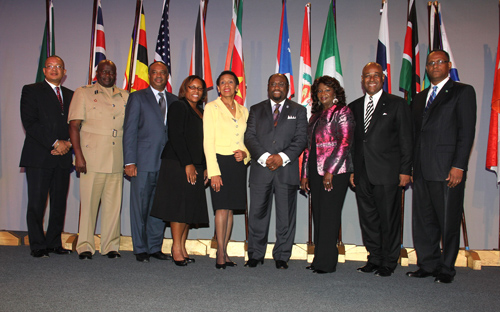
FREEPORT, Bahamas – In recent times, the cynicism of public distrust engendered by numerous political scandals has led to resurgence in many countries of the idea of public morality and a yearning for the return of moral values in public life, said Attorney General and Minister for Legal Affairs, Senator Allyson Maynard Gibson.
Mrs. Gibson was the featured speaker at the Myles Munroe International Global Leadership Summit 2013, which got underway Nov. 11, 2013 at the Grand Lucayan Resort on Grand Bahama Island.
Also bringing remarks at Monday’s opening session was the Minister for Grand Bahama, Dr. Michael Darville, and Tourism Minister Obie Wilchcombe.
Addressing hundreds of participants from some 50 countries attending the four-day summit, the Attorney General focused on the topic and theme for the summit: “Character – The Moral Force of Leadership.”
She used the occasion to congratulate Dr. Myles Munroe for his vision and leadership in forming the alliance of civil and religious world leaders to promote the tenets of principled leadership and morality in all aspects of life throughout the region and the world.
“It can only be by divine inspiration that the genesis of this idea for a global conglomerate of leaders came from this constellation of shallow seas, islands and cays, which have dedicated themselves in their founding constitutional documents to christian and spiritual values,” she told the people assembled in the Grand Ballroom of the Grand Lucayan.
She pointed out that when asked about the role of character in politics, some people immediately conjure up images of unscrupulous, corrupt or scandal-ridden politicians.
“This is because, almost universally, in history and in literature, politicians and secular leaders have been reviled and criticised for lacking in character and moral virtues,” she said.
She told the gathering that in the Bible, Proverbs 16 says that good leaders abhor wrongdoing of all kinds and sound leadership has a moral foundation. Mrs. Gibson also expressed that a variation on that theme appears in Proverbs 29.2 which notes that when the righteous rule, the people rejoice and when the wicked rule, the people groan.
Continuing, she told the gathering that in large part, this renewed focus on morality has been impelled not only by the transgressions of individual politicians, but by larger questions of public morality that have plagued the world community.
“These include the activities of unscrupulous bankers, which have plunged many economies into turmoil; the question of the treatment of terror suspects; the eavesdropping of government on private citizens; the permissible limits of warfare; examples of excesses amidst abject poverty; and many others,” she stated.
Touching on the subject of character, Senator Gibson noted that while most people tout character as a necessary attribute of political leadership, it is difficult to define what it means, and to determine the essential content of moral character, but one knows it when one sees it.
“It may denote a range of attributes of good behaviour or habits, such as empathy, courage, fortitude, honesty, loyalty, respect and responsibility.
“Interestingly, the word character is derived from the Greek word ‘charakter’, which means a mark impressed upon a coin, that is, something permanent, stable and unchanging. Because it is difficult to define but easy to recognise, I say that a person must demonstrate his or her character or be marked by his or her character,” she stated.
Senator Gibson informed that in a telephone poll conducted by the University of Virginia some time ago, the traits people most endorsed as the defining elements of character were being respectful, honest, fulfilling commitments, obeying the law, and working hard.
“These are traits of public civility that all decent citizens aspire to cultivate and exhibit, and do not necessarily set the politician apart.
“In fact, international efforts aimed at regulating the conduct of public officials, including politicians, through the combination of international conventions and domestic legislation, are all directed at preventing bribery and corruption.
“This is as it should be, for in reality these are the only aspects of morality that are capable of attracting and being enforced by a legal obligation. In contradistinction, the moral obligation or the dictates of conscience are the defining hallmark of character,” she said.
Senator Gibson added that it is altogether right to expect at the most basic level that leaders should be free from corruption.
“But this is far too legalistic and a narrow view to take of the matter. A sound character and strong moral life are essential prerequisites for political leadership, although this does not necessarily mean that a politician should be a saint,” she stated.
Questioning why is character in political leadership so important, she said it was the ancient Greek philosopher Plato, who reminded that leaders and rulers with character were those most likely to devote their lives to doing what they judge to be in the interest of the community.
She said that a similar sentiment was expressed by Michael Sandel who said in the 2009 Reith Lectures that the better kind of politics …. is politics oriented less to the pursuit of individual self-interest and more to the pursuit of the common good.
“These sentiments must be fully appreciated against a backdrop and culture where political leaders have been criticised as being more and more concerned with promoting their own personal interests and winning elections than solving critical national problems,” she said.
She reminded the gathering that strong leadership often requires the courage to stand up for what is right irrespective of the political, public or private consequences.
“It can sometimes involve making difficult choices that will not endear you to persons with whom you may share political alliances, or friendships, or other interests,” she said.
Senator Gibson stressed that Christian servants must show the world that when the righteous rule, the people rejoice.







